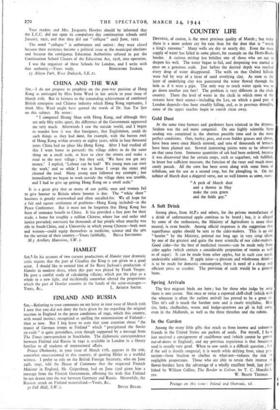CHINA AND THE WAR
SIR,—I do not propose to prophesy on the post-war position of Hong Kong as envisaged by Miss Irene Ward in her article in your issue of March loth. But in fairness to the astounding achievement of combined British enterprise and Chinese industry which Hong Kong represents, I think Miss Ward might have quoted the words of Dr. Sun Yat Sen on this subject. He wrote: " I compared Heung Shan with Hong Kong, and although they are only fifty miles apart, the difference of the Government oppressed me very much. Afterwards I saw the outside world, and I began to wonder how it was that foreigners, that Englishmen, could do such things as they had done, fox example, with the barren rock of Hong Kong within seventy or eighty years, while in four thousand years China had no place like Hong Kong. After I had studied all this I went home to persuadz the village elders to do the same thing on a small scale, at least to clear the streets and make a road to the next village ; but they said, ' We have not got any money.' I replied, `Labour can be had! We young men can start the work,' and so while I was at home I swept the street and cleaned the road. Many young men followed my example ; but immediately we began to work outside the village there was trouble, and I had to give up getting Hong Kong on a small scale."
It is a great pity that so many of our public men and women fail to give honour to Britain where honour is due. The " white sheet " business is greatly overworked and often uncalled-for. We all hope for a fair and square settlement of problems—Hong Kong included—at the Peace Conference. But it must not be forgotten that Hong Kong has been of immense benefit to China. It has provided a free port for their trade, a home for roughly a million Chinese, where law and order and justice prevailed, sanctuary for thousands of her people when anarchy was rife in South China, and a University in which young Chinese—both men and women—could equip themselves in medicine, science and the arts


























 Previous page
Previous page